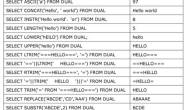分类: C/C++
不错
函数名: stpcpy
功 能: 拷贝一个字符串到另一个
用 法: char *stpcpy(char *destin, char *source);
程序例:
#include <stdio.h>
#include <string.h>
int main(void)
{
char string[10];
char *str1 = “abcdefghi”;
stpcpy(string, str1);
printf(“%s
“, string);
return 0;
}
函数名: strcat
功 能: 字符串拼接函数
用 法: char *strcat(char *destin, char *source);
程序例:
#include <string.h>
#include <stdio.h>
int main(void)
{
char destination[25];
char *blank = ” “, *c = “C++”, *Borland = “Borland”;
strcpy(destination, Borland);
strcat(destination, blank);
strcat(destination, c);
printf(“%s
“, destination);
return 0;
}
函数名: strchr
功 能: 在一个串中查找给定字符的第一个匹配之处
用 法: char *strchr(char *str, char c);
程序例:
#include <string.h>
#include <stdio.h>
int main(void)
{
char string[15];
char *ptr, c = ’r’;
strcpy(string, “This is a string”);
ptr = strchr(string, c);
if (ptr)
printf(“The character %c is at position: %d
“, c, ptr-string);
else
printf(“The character was not found
“);
return 0;
}
函数名: strcmp
功 能: 串比较
用 法: int strcmp(char *str1, char *str2);
看Asic码,str1>str2,返回值 > 0;两串相等,返回0
程序例:
#include <string.h>
#include <stdio.h>
int main(void)
{
char *buf1 = “aaa”, *buf2 = “bbb”, *buf3 = “ccc”;
int ptr;
ptr = strcmp(buf2, buf1);
if (ptr > 0)
printf(“buffer 2 is greater than buffer 1
“);
else
printf(“buffer 2 is less than buffer 1
“);
ptr = strcmp(buf2, buf3);
if (ptr > 0)
printf(“buffer 2 is greater than buffer 3
“);
else
printf(“buffer 2 is less than buffer 3
“);
return 0;
}
函数名: strncmpi
功 能: 将一个串中的一部分与另一个串比较, 不管大小写
用 法: int strncmpi(char *str1, char *str2, unsigned maxlen);
程序例:
#include <string.h>
#include <stdio.h>
int main(void)
{
char *buf1 = “BBB”, *buf2 = “bbb”;
int ptr;
ptr = strcmpi(buf2, buf1);
if (ptr > 0)
printf(“buffer 2 is greater than buffer 1
“);
if (ptr < 0)
printf(“buffer 2 is less than buffer 1
“);
if (ptr == 0)
printf(“buffer 2 equals buffer 1
“);
return 0;
}
函数名: strcpy
功 能: 串拷贝
用 法: char *strcpy(char *str1, char *str2);
程序例:
#include <stdio.h>
#include <string.h>
int main(void)
{
char string[10];
char *str1 = “abcdefghi”;
strcpy(string, str1);
printf(“%s
“, string);
return 0;
}
函数名: strcspn
功 能: 在串中查找第一个给定字符集内容的段
用 法: int strcspn(char *str1, char *str2);
程序例:
#include <stdio.h>
#include <string.h>
#include <alloc.h>
int main(void)
{
char *string1 = “1234567890”;
char *string2 = “747DC8”;
int length;
length = strcspn(string1, string2);
printf(“Character where strings intersect is at position %d
“, length);
return 0;
}
函数名: strdup
功 能: 将串拷贝到新建的位置处
用 法: char *strdup(char *str);
程序例:
#include <stdio.h>
#include <string.h>
#include <alloc.h>
int main(void)
{
char *dup_str, *string = “abcde”;
dup_str = strdup(string);
printf(“%s
“, dup_str);
free(dup_str);
return 0;
}
函数名: stricmp
功 能: 以大小写不敏感方式比较两个串
用 法: int stricmp(char *str1, char *str2);
程序例:
#include <string.h>
#include <stdio.h>
int main(void)
{
char *buf1 = “BBB”, *buf2 = “bbb”;
int ptr;
ptr = stricmp(buf2, buf1);
if (ptr > 0)
printf(“buffer 2 is greater than buffer 1
“);
if (ptr < 0)
printf(“buffer 2 is less than buffer 1
“);
if (ptr == 0)
printf(“buffer 2 equals buffer 1
“);
return 0;
}
函数名: strerror
功 能: 返回指向错误信息字符串的指针
用 法: char *strerror(int errnum);
程序例:
#include <stdio.h>
#include <errno.h>
int main(void)
{
char *buffer;
buffer = strerror(errno);
printf(“Error: %s
“, buffer);
return 0;
}
函数名: strcmpi
功 能: 将一个串与另一个比较, 不管大小写
用 法: int strcmpi(char *str1, char *str2);
程序例:
#include <string.h>
#include <stdio.h>
int main(void)
{
char *buf1 = “BBB”, *buf2 = “bbb”;
int ptr;
ptr = strcmpi(buf2, buf1);
if (ptr > 0)
printf(“buffer 2 is greater than buffer 1
“);
if (ptr < 0)
printf(“buffer 2 is less than buffer 1
“);
if (ptr == 0)
printf(“buffer 2 equals buffer 1
“);
return 0;
}
函数名: strncmp
功 能: 串比较
用 法: int strncmp(char *str1, char *str2, int maxlen);
程序例:
#include <string.h>
#include <stdio.h>
int main(void)
{
char *buf1 = “aaabbb”, *buf2 = “bbbccc”, *buf3 = “ccc”;
int ptr;
ptr = strncmp(buf2,buf1,3);
if (ptr > 0)
printf(“buffer 2 is greater than buffer 1
“);
else
printf(“buffer 2 is less than buffer 1
“);
ptr = strncmp(buf2,buf3,3);
if (ptr > 0)
printf(“buffer 2 is greater than buffer 3
“);
else
printf(“buffer 2 is less than buffer 3
“);
return(0);
}
函数名: strncmpi
功 能: 把串中的一部分与另一串中的一部分比较, 不管大小写
用 法: int strncmpi(char *str1, char *str2);
程序例:
#include <string.h>
#include <stdio.h>
int main(void)
{
char *buf1 = “BBBccc”, *buf2 = “bbbccc”;
int ptr;
ptr = strncmpi(buf2,buf1,3);
if (ptr > 0)
printf(“buffer 2 is greater than buffer 1
“);
if (ptr < 0)
printf(“buffer 2 is less than buffer 1
“);
if (ptr == 0)
printf(“buffer 2 equals buffer 1
“);
return 0;
}
函数名: strncpy
功 能: 串拷贝
用 法: char *strncpy(char *destin, char *source, int maxlen);
程序例:
#include <stdio.h>
#include <string.h>
int main(void)
{
char string[10];
char *str1 = “abcdefghi”;
strncpy(string, str1, 3);
string[3] = ’�’;
printf(“%s
“, string);
return 0;
}
函数名: strnicmp
功 能: 不注重大小写地比较两个串
用 法: int strnicmp(char *str1, char *str2, unsigned maxlen);
程序例:
#include <string.h>
#include <stdio.h>
int main(void)
{
char *buf1 = “BBBccc”, *buf2 = “bbbccc”;
int ptr;
ptr = strnicmp(buf2, buf1, 3);
if (ptr > 0)
printf(“buffer 2 is greater than buffer 1
“);
if (ptr < 0)
printf(“buffer 2 is less than buffer 1
“);
if (ptr == 0)
printf(“buffer 2 equals buffer 1
“);
return 0;
}
函数名: strnset
功 能: 将一个串中的所有字符都设为指定字符
用 法: char *strnset(char *str, char ch, unsigned n);
程序例:
#include <stdio.h>
#include <string.h>
int main(void)
{
char *string = “abcdefghijklmnopqrstuvwxyz”;
char letter = ’x’;
printf(“string before strnset: %s
“, string);
strnset(string, letter, 13);
printf(“string after strnset: %s
“, string);
return 0;
}
函数名: strpbrk
功 能: 在串中查找给定字符集中的字符
用 法: char *strpbrk(char *str1, char *str2);
程序例:
#include <stdio.h>
#include <string.h>
int main(void)
{
char *string1 = “abcdefghijklmnopqrstuvwxyz”;
char *string2 = “onm”;
char *ptr;
ptr = strpbrk(string1, string2);
if (ptr)
printf(“strpbrk found first character: %c
“, *ptr);
else
printf(“strpbrk didn’t find character in set
“);
return 0;
}
函数名: strrchr
功 能: 在串中查找指定字符的最后一个出现
用 法: char *strrchr(char *str, char c);
程序例:
#include <string.h>
#include <stdio.h>
int main(void)
{
char string[15];
char *ptr, c = ’r’;
strcpy(string, “This is a string”);
ptr = strrchr(string, c);
if (ptr)
printf(“The character %c is at position: %d
“, c, ptr-string);
else
printf(“The character was not found
“);
return 0;
}
函数名: strrev
功 能: 串倒转
用 法: char *strrev(char *str);
程序例:
#include <string.h>
#include <stdio.h>
int main(void)
{
char *forward = “string”;
printf(“Before strrev(): %s
“, forward);
strrev(forward);
printf(“After strrev(): %s
“, forward);
return 0;
}
函数名: strset
功 能: 将一个串中的所有字符都设为指定字符
用 法: char *strset(char *str, char c);
程序例:
#include <stdio.h>
#include <string.h>
int main(void)
{
char string[10] = “123456789”;
char symbol = ’c’;
printf(“Before strset(): %s
“, string);
strset(string, symbol);
printf(“After strset(): %s
“, string);
return 0;
}
函数名: strspn
功 能: 在串中查找指定字符集的子集的第一次出现
用 法: int strspn(char *str1, char *str2);
程序例:
#include <stdio.h>
#include <string.h>
#include <alloc.h>
int main(void)
{
char *string1 = “1234567890”;
char *string2 = “123DC8”;
int length;
length = strspn(string1, string2);
printf(“Character where strings differ is at position %d
“, length);
return 0;
}
函数名: strstr
功 能: 在串中查找指定字符串的第一次出现
用 法: char *strstr(char *str1, char *str2);
程序例:
#include <stdio.h>
#include <string.h>
int main(void)
{
char *str1 = “Borland International”, *str2 = “nation”, *ptr;
ptr = strstr(str1, str2);
printf(“The substring is: %s
“, ptr);
return 0;
}
函数名: strtod
功 能: 将字符串转换为double型值
用 法: double strtod(char *str, char **endptr);
程序例:
#include <stdio.h>
#include <stdlib.h>
int main(void)
{
char input[80], *endptr;
double value;
printf(“Enter a floating point number:”);
gets(input);
value = strtod(input, &endptr);
printf(“The string is %s the number is %lf
“, input, value);
return 0;
}
函数名: strtok
功 能: 查找由在第二个串中指定的分界符分隔开的单词
用 法: char *strtok(char *str1, char *str2);
程序例:
#include <string.h>
#include <stdio.h>
int main(void)
{
char input[16] = “abc,d”;
char *p;
/* strtok places a NULL terminator
in front of the token, if found */
p = strtok(input, “,”);
if (p) printf(“%s
“, p);
/* A second call to strtok using a NULL
as the first parameter returns a pointer
to the character following the token */
p = strtok(NULL, “,”);
if (p) printf(“%s
“, p);
return 0;
}
函数名: strtol
功 能: 将串转换为长整数
用 法: long strtol(char *str, char **endptr, int base);
程序例:
#include <stdlib.h>
#include <stdio.h>
int main(void)
{
char *string = “87654321”, *endptr;
long lnumber;
/* strtol converts string to long integer */
lnumber = strtol(string, &endptr, 10);
printf(“string = %s long = %ld
“, string, lnumber);
return 0;
}
函数名: strupr
功 能: 将串中的小写字母转换为大写字母
用 法: char *strupr(char *str);
程序例:
#include <stdio.h>
#include <string.h>
int main(void)
{
char *string = “abcdefghijklmnopqrstuvwxyz”, *ptr;
/* converts string to upper case characters */
ptr = strupr(string);
printf(“%s
“, ptr);
return 0;
}
函数名: swab
功 能: 交换字节
用 法: void swab (char *from, char *to, int nbytes);
程序例:
#include <stdlib.h>
#include <stdio.h>
#include <string.h>
char source[15] = “rFna koBlrna d”;
char target[15];
int main(void)
{
swab(source, target, strlen(source));
printf(“This is target: %s
“, target);
return 0;
}




